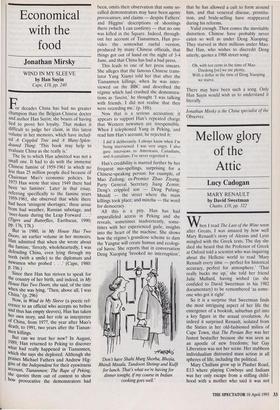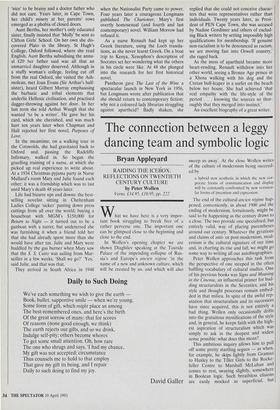Mellow glory of the Attic
Lucy Cadogan
MARY RENAULT by David Sweetman Chatto, £18, pp. 322 hen I read The Last of the Wine soon after Greats, I was amazed by how well Mary Renault's story of Alexias and Lysis mingled with the Greek texts. The day she died she heard that the Professor of Greek at Oxford told a scientist who was inquiring about the Hellenic world to read 'Mary Renault every time — perfect for historical accuracy, perfect for atmosphere.' That really bucks me up,' she told her friend Julie Mullard, having wished (as she confided to David Sweetman in his 1982 documentary) to be remembered 'as some- one who got it right'.
So it is a surprise that Sweetman finds the most intriguing aspect of her life the emergence of a bookish, suburban girl into a key figure in the sexual revolution. As indeed it surprised Renault, isolated from the Sixties in her old-fashioned milieu of Cape Town, that The Persian Boy was her fastest bestseller because she was seen as an apostle of new freedoms; but Gay Liberation was not her scene. Her stubborn individualism distrusted mass action in all spheres of life, including the political.
Mary Challans grew up in Plashet Road, E13 where playing Cowboys and Indians was her only escape from a stifling child- hood with a mother who said it was not 'nice' to be brainy and a doctor father who did not care. Years later, in Cape Town, her child's misery at her, parents' rows emerged as a phobia of closed doors.
Aunt Bertha, her mother's only educated sister, finally insisted that 'Molly' be sent to Clifton Girls' School. On her own she dis- covered Plato in the library. St Hugh's College, Oxford followed, where she read English, Aunt Bertha subsidising the annu- al £20 her father said was all that an unmarried daughter deserved. Although in a stuffy woman's college, feeling cut off from the real Oxford, she visited the Ash- molean, met Joan Evans (Sir Arthur's half- sister), heard Gilbert Murray emphasising the barbaric and tribal elements that underlie Hellenic civilisation, and practised dagger-throwing against her door. In her last term she told Arthur Waugh that she wanted `to be a writer'. He gave her his card, which she cherished, and was much hurt ten years later when Chapman and Hall rejected her first novel, Purposes of Love.
In the meantime, on a walking tour in the Cotswolds, she had gravitated back to Oxford and, passing the Radcliffe Infirmary, walked in. So began the gruelling training of a nurse, at which she picked up real experience to write about. At a 1934 Christmas pyjama party in Nurse Mullard's room Mary and Julie found each other; it was a friendship which was to last until Mary's death 48 years later.
Life had bizarre ups and downs: the best- selling novelist sitting in Cheltenham Ladies College 'sicker' pasting down press cuttings from all over the world; buying a houseboat with MGM's $150,000 for Return to Night — it turned out to be a gunboat with a turret, but undeterred she was furnishing it when a friend told her that she had already spent more than she would have after tax. Julie and Mary were huddled by the gas burner when Mary saw that the S. S. Cairo was sailing from Mar- seilles in a few weeks. 'Shall we go?' Yes,' said Julie, and that was that.
They arrived in South Africa in 1948 when the Nationalist Party came to power. Four years later a courageous Longmans published The Charioteer, Mary's first overtly homosexual (and fourth and last contemporary) novel. William Morrow had refused it.
As a nurse Renault had kept up her Greek literature, using the Loeb transla- tions, as she never learnt Greek. On a boat trip to Kenya, Xenophon's description of Socrates set her wondering what the others in his circle were like. At 48 she plunged into the research for her first historical novel.
Pantheon gave The Last of the Wine a spectacular launch in New York in 1956, but Longmans wrote after publication that she should return to contemporary fiction: why not a coloured lady librarian struggling against apartheid? Badly shaken, she replied that she could not conceive charac- ters that were representatives rather than individuals. Twenty years later, as Presi- dent of PEN Cape Town, she was accused by Nadine Gordimer and others of exclud- ing Black writers by setting impossibly high qualifications for membership. 'If genuine non-racialism is to be denounced as racism, we are moving fast into Orwell country,' she raged back.
As the mess of apartheid became more heart-rending, Renault withdrew into her other world, seeing a Bronze Age prince in a Xhosa walking with his dog and the Cretan bull-leaper in a surfer on the beach below her house. She had achieved 'that real empathy with the life-style of the period . . . knowing the sources so thor- oughly that they merged into instinct.'
An excellent biography of a great writer.



























































 Previous page
Previous page